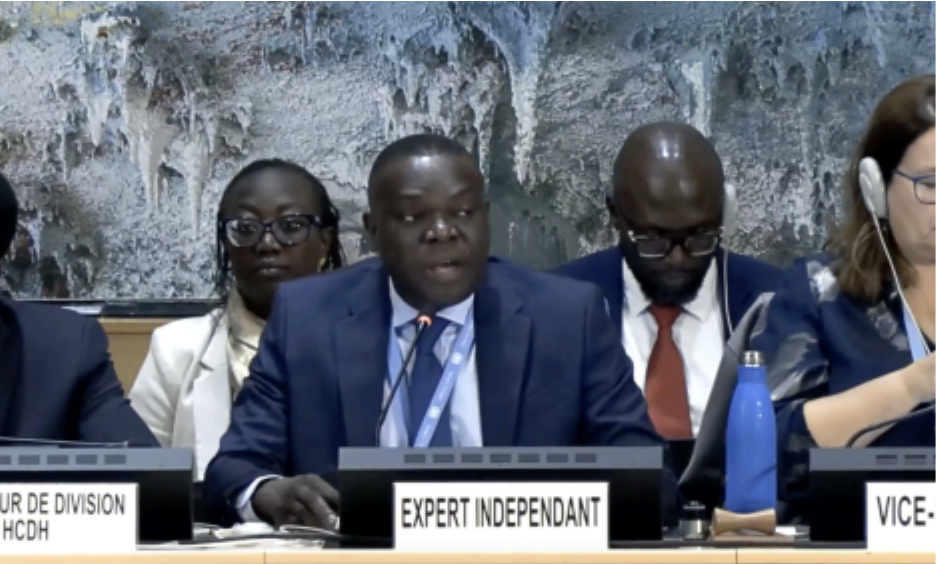
The Politics of Unaccountability: Impunity and Insecurity in the Central African Republic
The 60th Session of the Human Rights Council
8 September - 8 October
Item 10: ID with IE on the Central African Republic
2 October 2025
By Shalina Prakash / GICJ
Executive Summary
The Interactive dialogue with the Independent Expert on the issue of human rights in the Central African Republic took place during the 38th meeting of the 60th session of the Human Rights Council. Concluding with the Independent Expert recognising CAR’s resilience and significant progress, the recognition was also met with numerous delegations emphasising the urgent and essential need for continued support for a country that has experienced protracted conflict.
Expressing grave concerns over recurrent human rights violations and breaches of international humanitarian law, Mr. Agbetse outlined essential services the Central African Republic needs, directing his recommendations to the international community, crucial stakeholders in the region and the CAR government. He also acknowledged the cooperation and commitment of the authorities of the Central African Republic, as well as the United Nations Multidimensional Integrated Stabilisation Mission in the
Central African Republic (MINUSCA), alongside stakeholders who have contributed to a successful completion of his mandate over the past six years.
Background
Mr. Yao Agbetse’s report, A/HRC/60/89, highlights several important issues that continue to pervade CAR and obstruct its path to recovery. These key issues include, but are not limited to, the continued presence of armed groups, lack of accountability mechanisms, non-compliance with peace treaties, and extreme social insecurity.
The signing of the Political Agreement for Peace and Reconciliation in 2019 marked a step forward for rights, but its limited enforceability and unimpeded violation by security forces continue to block meaningful social protection. Despite government efforts to establish frameworks for justice and accountability, defence and security forces continue to commit grave violations. Persistent abuses not only delay progress toward justice and reconciliation but also undo critical development work carried out by MINUSCA. Reports of sexual exploitation and abuse by peacekeepers have weakened community trust and heightened risks to civilians, particularly endangering women and girls. Strengthening national human rights institutions remains essential to ensure accountability, restore confidence and safeguard a population that has endured six coups since the country gained independence in 1960.
Summary of Independent Expert’s Report
Human rights developments from 2020 to 2025
Reviewing the time between 2020 and 2025, Mr. Agbetse stressed that the Central African Republic continues to face a deeply troubling period concerning fundamental liberties, marked by ongoing aggression and abuses. As extrajudicial killings, extreme sexual violence, rebel activity and banditry continue unabated, he asserted that achieving lasting peace and rebuilding national dignity necessitates concrete, sustainable measures to confront the country’s enduring challenges. There is a worrying rise in human rights violations, primarily at the hands of armed factions and by national defence and security forces, discounting the number of undocumented violations, which are likely significantly higher. Despite various attempts to establish peace, the situation remains volatile, with the past few years seeing a fluctuating but generally upward trend in violations.
Whilst early peace efforts, including the Political Agreement for Peace and Reconciliation in 2019, offered initial improvements, challenges remain regarding compliance with civilian protection rules. Beginning in early 2024, the situation deteriorated further, with increased abuses from both cooperating and non-cooperating militias. The Azande Ani Kpi Gbe committed severe violations in Zemio, Dembia and Rafai, and Haut-Mbomou, including killings, gang rapes, torture and expropriations, targeting Muslim, Fulani and Sudanese asylum seekers. Russian bilateral forces, despite purporting to support national authorities, were also implicated in violations, extortion and accusations of gross misconduct. Although enlisted to support the Armed Forces of the Central African Republic, Russian forces were found guilty of involvement in violations, extortions, confiscations and illegal checkpoints, ultimately failing to exercise the due diligence to prevent abuses by members they had trained in the Azande Ani Kpi Gbe.
The Security Council, through Resolution 2745 (2024), lifted the arms embargo on the Central African
Republic (CAR) that had been in place since 2013, but concerns remain about the potential for armed groups to acquire weapons, which could worsen CAR’s fragility. To mitigate this risk, the Security Council must ensure strict compliance from arms-producing nations and CAR's neighbours with the new resolution by implementing recommendations from various expert panels and the Sanctions Committee.
CAR’s tenuous peace is threatened by fragmented DDRR implementation, risking renewed armed group activity and requiring full ex-combatant integration and decisive action against groups like Azande Ani Kpi Gbe. Human rights policies are stymied by resource and coordination deficits, failing sexual violence victims and abused children. Confronted with conflicts linked to transhumance around Boali and Bouboui, recommendations were issued at a national high-level conference in May 2024, but they lack practical execution and demand concrete measures for security and cross-border cooperation. In parallel, Mr. Agbetse welcomes MINUSCA's zero-tolerance policy on sexual abuse by peacekeepers, and commends Gabon and Rwanda‘s commitment to it.
Challenges and means of consolidating State authority
The country’s peace process, per the 2023 strategic review, lauded advancements in decentralisation, DDR support, transhumance management, and electoral awareness, with prefecture committees notably dismantling illegal checkpoints on routes linking Berbérati with Bania, Gamboula and Nandobo, However, despite a high-level conference, operational measures against farmer-herder tensions remain elusive, and joint commissions struggle to enact tangible, coordinated transhumance solutions. Further, 217 republican dialogue recommendations from 2022 languish due to absent ministerial focal points and weak institutional integration, resulting in a low implementation rate four years post-validation.
In September 2024, the Strategic Committee for DDR convened for the 10th time amid deep internal divisions among armed groups. The 2020 emergence of the Coalition des patriotes pour le changement (CPC) and its expanding support created an ambiguous and destabilising dynamic, jeopardising the Political Agreement for Peace and Reconciliation. This instability is underscored by violent clashes in June 2025 between rival Retour, réclamation et réhabilitation factions in Ouham-Pendé. As other members participated in disarmament, UPC and 3R continued egregious human rights violations.
Six years into the political agreement, nine armed groups have disbanded, and others are commencing withdrawal. Success hinges on a comprehensive DDR program, securing demilitarised zones, restoring public services, and reducing community violence for sustainable reintegration. Azande Ani Kpi Gbe, a
group responsible for flagrant human rights abuses and international humanitarian law breaches in Mbomou and Haut-Mbomou, remains a paramount challenge. Their estimated 5,000 members include 200 trained by Russian forces and integrated into the national army, raising serious concerns.
Infrastructure is a peace and security imperative for CAR, key to the restoration of state authority and increased access to contested zones. Rebuilding vital sector infrastructure (security, justice, education, health, sport, culture) is foundational for peacebuilding, equitable development, social justice, and resilience.
Building on a 2025 Bangui seminar with the Ministry of Territorial Administration, Decentralisation and Local Development, HRC's dialogue at the 58th session, underscored decentralisation's role in CAR's human rights, state authority, and peace. Though the 2022-2032 National Policy has been adopted, implementation lags, but the 2024-2028 National Development Plan offers renewed impetus.
Local elections, repeatedly delayed since 2022, with those on August 31st imperilled by electoral authority dysfunctions, cast doubt on the 2025 general elections' viability. True decentralisation transcends elections, demanding effective competence/resource transfer, inter-electoral dialogue, a coherent local government policy delineating regional and communal roles, and constitutional implementation of local authorities and traditional leaders' chambers.
Combined local, legislative, and presidential elections, announced for December, risk marginalising local polls and amplifying logistical challenges. The Independent Expert's call for an institutional overhaul of the National Electoral Authority (ANE) reflects deep-seated dysfunctions, undermining optimal preparation despite national/international support and anti-electoral violence initiatives. Technical and organisational hurdles persist, with no provisional electoral roll, demanding a definitive list by September and budget adjustments for the combined elections. A May 2025 derogation law suspending Electoral Code article 18 underscores ANE's struggles, presaging a potential political crisis if immediate institutional reform fails to ensure constitutional adherence for legislative and presidential polls.
Peace and reconciliation
The 2025 N'Djamena Peace Agreement, signed by the CAR Government and CPC-affiliated 3R and UPC, revitalised the peace process. Although these groups pledged to rejoin the Political Agreement, cease hostilities, and commit to the DDR process, during the government’s implementation in Bangassou, Bria, Koui, Nzakoundou, Obo, and Sangrelim, 3R have demonstrated a limited and ambiguous form of voluntary disarmament, leaving their true intentions uncertain. The situation calls for continued vigilance by the AU and ECCAS, as guarantors of the Political Agreement.
The Community Violence Reduction program is deemed a crucial complement to DDR, collectively restoring security and national cohesion by facilitating socioeconomic integration, dialogue, and peaceful relations, enabling thousands to abandon violence for income-generating activities, paid work, or vocational training.
A judicial inquiry in Haut-Mbomou (Oct 2024 - Feb 2025) led to arrests for past human rights violations, a welcome but limited precedent. However, the 2025 Peace Agreement saw UPC and 3R representatives appointed as ministerial advisors, despite ongoing human rights concerns. Mr. Agbetse emphasised that political accords do not negate accountability for violations, nor CAR's international obligations.
The Special Criminal Court achieved landmark convictions for war crimes and crimes against humanity in the Ndélé 1 (2020 clashes) and Ndélé 2 (2020 abuses) cases, though some charges were dismissed and one key defendant acquitted. Progress is hampered by unexecuted arrest warrants for François Bozizé and Hassan Bouba Ali, the latter released despite ongoing proceedings. Compounding these challenges, the Court faces critical financial deficits, exacerbated by the international aid crisis, threatening its future operations.
While the ICC Trust Fund offers support, an autonomous reparation mechanism for the Special Criminal Court is vital for comprehensive justice. The Court's specialised methods and best practices, covering victim/witness protection, defence rights, evidence preservation, and procedural tools, must be leveraged to enrich the national justice system.
The ICC's Trial Chamber, on July 24, 2025, convicted Alfred Yekatom and Patrice-Edouard Ngaïssona of war crimes and crimes against humanity from the Anti-Balaka's 2013-2014 attacks, sentencing them to 15 and 12 years, respectively. However, National courts are equally crucial for combating impunity and strengthening democracy. Though MINUSCA-renovated and Bangui Courts of Appeal are active, processing numerous serious cases, the justice sector faces chronic underfunding, limited rural presence, and systemic issues like overcrowding, detention period violations, and ethical concerns.
Moreover, despite continued efforts, CAR's detention facilities remain dire, with severe overcrowding (Ngaragba at 282%), rampant hygiene issues, violence, inadequate food and medical care, and prolonged pretrial detention. Along with the absence of reintegration programs and continued problematic detentions such as Armel Sayo's and Joseph Figueira Martin's, these conditions underscore systemic failures in upholding human rights and procedural guarantees within the justice system.
The Truth, Justice, Reparation and Reconciliation Commission has failed to fulfil its mandate due to resource scarcity and internal strife, leading to the termination of all commissioners in May 2024 and the subsequent appointment of new ones in March 2025. As, in spite of changes and an induction, internal tensions persist, notably regarding bureau elections, Mr. Agbetse recommends attaching the Commission to the Ministry of Justice for improved operational efficiency.
The Haut-Mbomou and Haut-Oubangui regions are suffering severe insecurity and human rights abuses from armed groups targeting specific communities, compounded by Sudanese instability fueling cross-border armed activity and resource exploitation in Vakaga.
Status of governance and human rights institutions
While a National Observatory for Parity to promote gender equality was established in February 2024, it lacks operational capacity, and despite donor preference for NGOs over technically weak ministries, Mr. Agbetse stresses the need to integrate national institutions and civil society into projects, with ministerial capacity-building.
Human rights
Civic freedoms remain restrictive, with peaceful demonstrations prohibited or quelled, and human rights activists detained. Whilst a law protecting human rights activists was passed by the National Assembly in 2024, its promulgation remains pending. The nation has made efforts to comply with international human rights reporting requirements, submitting reports to various global institutions, but similar engagement with African organisations was lacking.
In essence, the past few years have been overarchingly marked by persistent human rights violations, frail improvements in the peace process, significant institutional challenges, and an urgent need for concerted national and international efforts to ensure accountability, strengthen governance, and uphold basic rights.
Summary of the Interactive Dialogue
In the report presented by the Independent Expert on the issue of human rights in the Central African Republic, Mr. Agbetse underlined the urgency of disarmament to mitigate violations by non-state actors and pressed on the significance of the upcoming elections in establishing a degree of peace and control. These priorities constituted the crux of the dialogue, with delegates of multiple countries recognising and acknowledging the gravity of the situation and reaffirming their commitment to supporting the Independent Expert’s recommendations. Mr. Agbetse also strongly condemned the deep-rooted structural impunity which underpins several issues that undermine justice and stability in the country. He compelled the UN and ICC to intensify sanctions and extend technical and operational support to ensure perpetrators of serious human rights violations, especially against women, girls, and children, are brought to justice through mechanisms that are effectively enforced.
Opening Statement

The Independent Expert on CAR, Mr. Yao Agbetse commenced the discussion by recalling that when Resolution 2434 (2013) established the mandate of the Independent Expert on the human rights situation in the Central African Republic, the country was experiencing near-total institutional collapse. Reflecting on his appointment six years ago, the Independent Expert described the situation at the time as a “haemorrhage” affecting every sphere of national life, including the “security, social, economic, political, and financial.”
At the security level, the signing of the peace agreement 19th April 2025 in N’Djamena between the Government of the Central African Republic and the armed groups Unité pour la Paix en Centrafrique (UPC) and Retour, Réclamation et Réhabilitation (3R), as part of ongoing efforts to reinvigorate implementation of the Political Agreement for Peace and Reconciliation in the Central African Republic (APPR-RCA), constituted a key milestone in reactivating the peace process, in accordance with the framework established under the Khartoum Accord of 19 February 2019. But dissolving all armed groups, irrespective of their participation in peace agreements, should be treated as a primary objective. Dissolution efforts must be accompanied by organised disarmament and demobilisation, along with the provision of fundamental social services in demilitarised zones, to support long-term stabilisation, which requires coordinated security responses at three distinct levels:
- At the national level, strengthening the security sector should be a priority. This includes enhanced training, provision and deployment of appropriate equipment, especially in border areas. MINUSCA should be given greater means, including improved aerial surveillance capabilities, to advance bases in border zones, notably Vakaga along the Sudanese border and Mbomou adjacent to South Sudan.
- At the subregional level, the African Union should consider organising a subregional conference focused on peace and development to coordinate efforts and strengthen regional cooperation, as instability persists, particularly due to the ongoing conflict in Sudan. Border security is key to facilitating the free movement of people, ensuring safe economic activity, supporting the return of refugees, enforcing an arms embargo, and encouraging a subregional dialogue on transhumance.
- At the international level, the Security Council must ensure the full implementation of Resolution 2745, including strict prohibitions on weapons provisions to armed groups operating in the Central African Republic. Enforcement of sanctions against individuals listed by the Security Council should be rigorous and consistent. In the long term, building the “strategic and operational capacities” of the Central African Armed Forces is essential for reducing the country’s reliance on foreign aid, key to achieving sustainable security.
At the political level, the Central African Republic is preparing for its first round of local, municipal, legislative and presidential elections scheduled for December. Establishing continuous and structured political dialogue is essential, and Mr. Agbetse emphasised that it must necessarily be guided by principles of justice and equity. With numerous delays due to internal disruption, immediate institutional reforms, along with targeted support for the national elections authority, are crucial to enable optimal operations. To guarantee free, transparent and inclusive elections, with meaningful participation of youth and women, the National Elections Authority should implement robust measures before, during and after voting to curb potential violence, protests and unrest.
Candidates must be guaranteed equal access to public media, irrespective of political affiliations, and adequate security measures must be in place to uphold the credibility of the electoral process. He emphasised the need for sufficient logistical support for the Electoral Authority to create conditions necessary for such transparency, and to prevent a dire political crisis that would existentially exacerbate the country’s woes.
CAR’s heavy reliance on foreign aid highlights the need for a “renewed model of economic governance”, grounded in “strategic planning and proactive leadership” in order to promote transparent and equitable resource governance. The scale of CAR’s challenges also makes “decentralisation and strengthened local governance” fundamental. Municipal elections offer this chance to implement the national policy for decentralisation and territorial development 2022-32, but risk obfuscation as multiple simultaneous elections can compound challenges. Decades of conflict and instability have eroded societal cohesion, and poverty remains entrenched, leaving the population extremely vulnerable as the social protection system continues to be insufficient.
Mr. Agbetse also reinforced the need for regular criminal hearings in combating impunity. Continuous training for magistrates and judicial officers should be prioritised to strengthen the justice system, alongside a security one. Complete demilitarisation of detention facilities, alongside implementation of a comprehensive reintegration plan for detainees, is critical to prevent arbitrary releases and reduce the risk of recidivism. Mr. Agbetse called not only for adequate technical and financial assistance to sustain the court’s operations, but also for the assimilation of the Truth and Justice Commission under the Ministry of Justice in order to ensure an effective institutional framework.
With the fate of the population inextricably linked to the country’s security situation and to the provision of basic services such as drinking water, education, social protection and healthcare, the IE called for extending the state authority through effective implementation of the national policy of human rights, and its associated action plan to patch deep social fractures. Mr. Agbetse thanked the Central African Republic for its cooperation, foregrounding the country's persistent “will to strengthen national institutions on human rights,” despite the ceaseless challenges it faces.
Country Statements
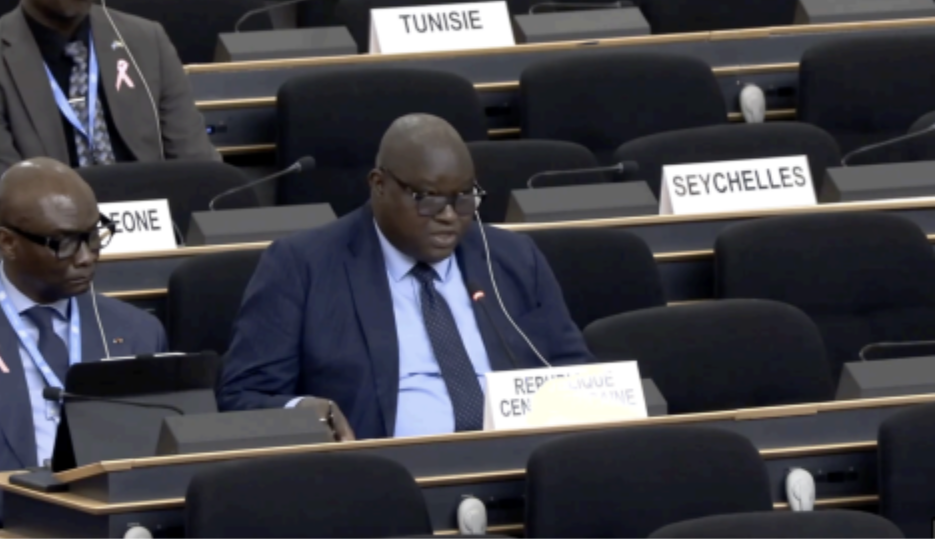
The Central African Republic expressed satisfaction with the cooperation between Mr. Agbetse and human rights actors in CAR. They maintained CAR’s active commitment to restoring state authority, ensuring security, fighting impunity, strengthening democracy and the rule of law, upholding human rights and pursuing sustainable development. With every municipal area across the country now operating under administrative authority, state authority is on its way to re-establishment. Security reforms are proving effective in toughening national armed and police forces. Justice, once hindered by crises, is recovering, with national courts operational alongside 24 new courts and 100 new judges, significantly improving access. Criminal hearings address serious human rights violations, and despite budget constraints, the Special Criminal Court continues to adjudicate, and the Truth, Justice, Reparation and Reconciliation Commission has also been established. In preparing for the December elections, CAR hopes to renew democracy and establish local governance, recognising the immediacy of doing so. With a five-year national plan (2023-28) underway, the country contends that progress is evident in human rights and development. After a successful investment roundtable in Casablanca, CAR also reiterates its reliance on international collaboration and calls for sustained global solidarity to restore hope for its citizens.
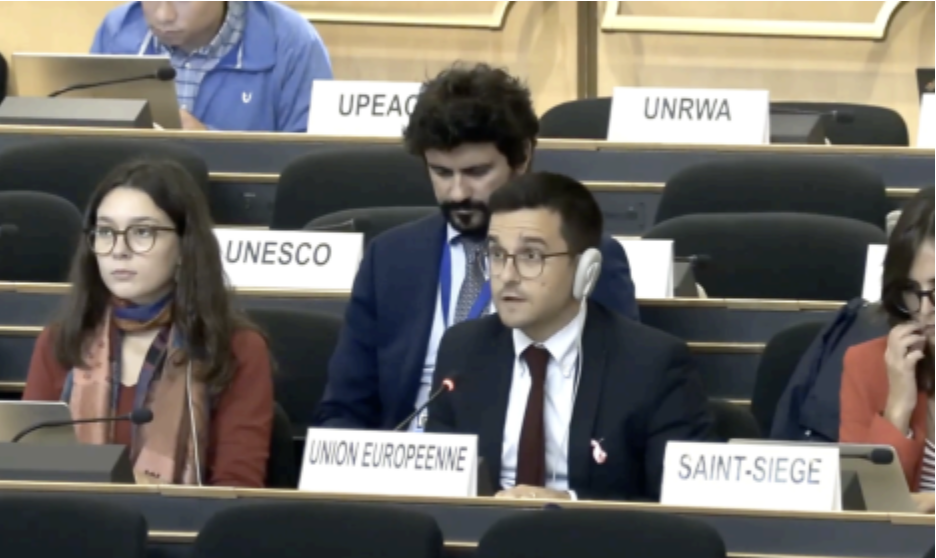
The European Union recognised the progress made but also the fragility of the current situation. They emphasised the plight of civilians who are enduring the crisis’ heaviest burden, stressing that the withdrawal of mercenaries is key to lasting peace. They called on signatories of the 19th April peace agreement to respect terms, notably on DDR, and encouraged CAR and its partners to continue recommendations as outlined in the Independent Expert’s report.
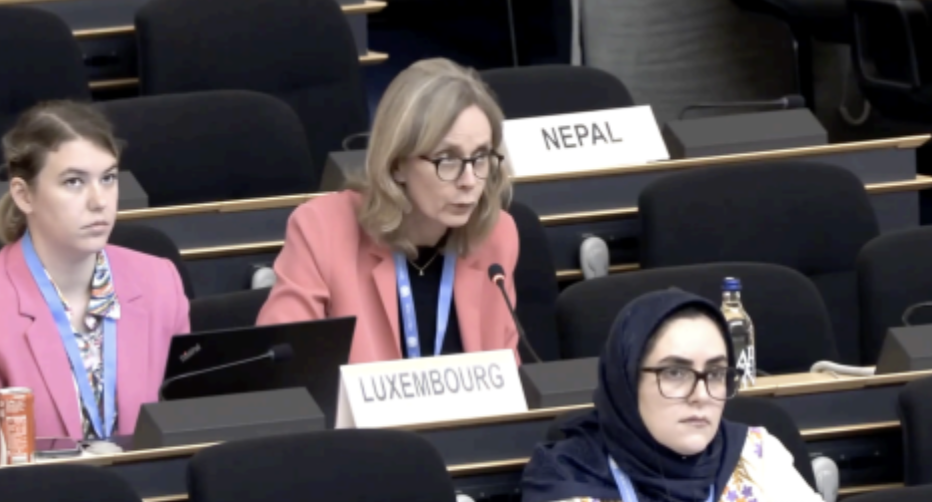
Luxembourg, on behalf of Belgium and the Netherlands, observed the precarity of the current situation and asserted the significance of the upcoming elections in providing a crucial opportunity for establishing a “democratic, inclusive and peaceful” society. Strongly condemning crimes committed, particularly in the unstable eastern region, Luxembourg expressed concern over spillover into neighbouring Sudan, where increased conflict has led to heightened smuggling. Ahead of the incoming elections, they called on CAR to ensure civil liberties are protected, including the right to freedom of assembly, and for an end to the use of torture. They also commended the nation for ratifying the Maputo Protocol on women's rights last July.
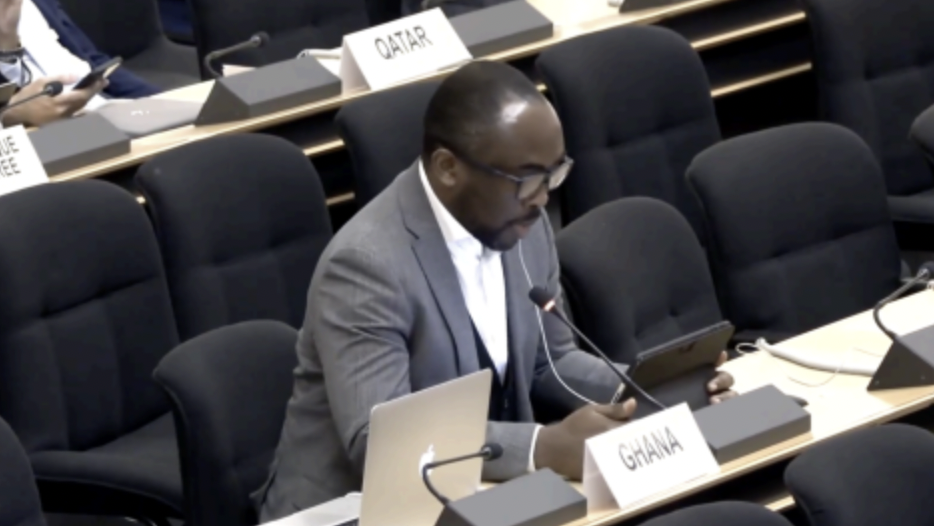
Ghana, on behalf of the African Group, cited CAR’s constructive cooperation with UN mechanisms and welcomed its commitment to submit its candidacy to serve on the HRC and contribute to the work undertaken by the body. They encourage delegations to collectively approve a proposal for capacity development in CAR, demonstrating a continued and unified backing from its global partners.
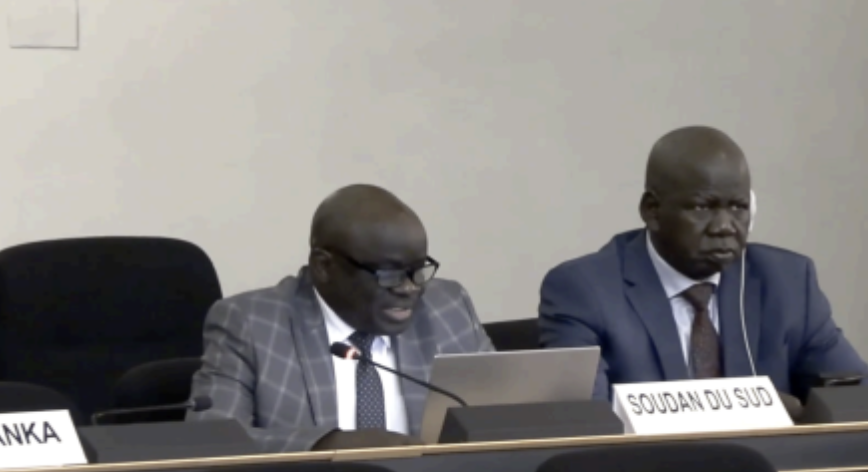
South Sudan aligns with the African Group’s statement, and similarly applauds the country’s cooperation to restore peace, security and stability. They concur with the IE’s findings, highlighting the immediate need to bolster national institutions, including training, resources and deployment of defence and security forces, as well as solid accountability systems for the country to tackle problems effectively.
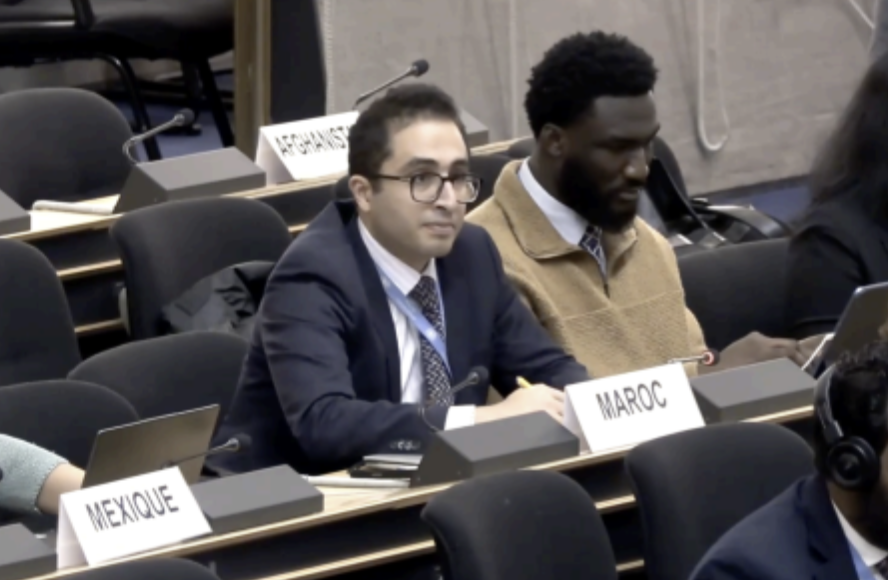
Morocco fully backs CAR’s government in its pursuit of peace and its collaboration with UN initiatives. Citing its initiative in organising the investment roundtable for CAR’s national plan for development, Morocco declared its firm commitment to support the nation’s efforts towards holding legislative and presidential elections; it also appreciated the progress made on the action plan for implementing the UPR’s accepted recommendations.
Cameroon stands with the African Group, commending CAR’s collaboration with the UN and its disarmament programs. They note the Special Criminal Court’s advancements and the formation of the Truth and Justice commission, emphasising the need for these bodies to be well-resourced and independent to serve victims. As a neighbouring country especially watchful of border security, they urge global partners to increase peacebuilding aid, reaffirming their dedication to CAR’s stability and prosperity.
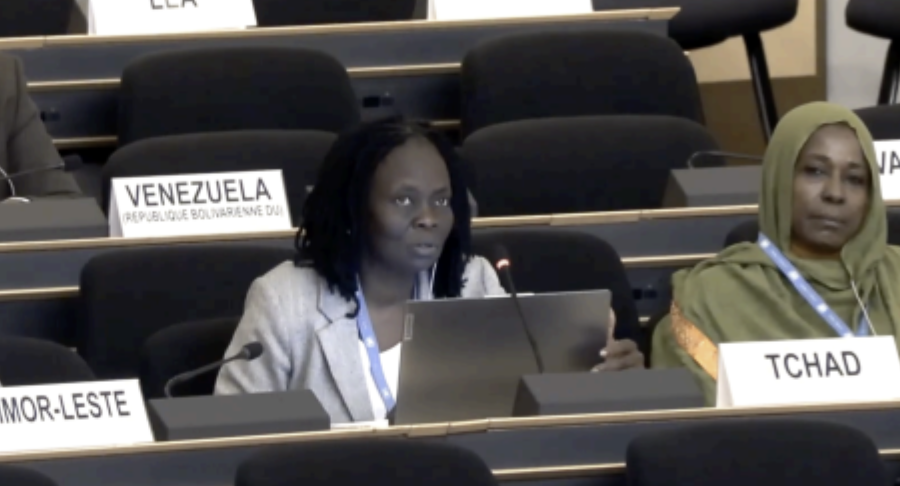
Chad welcomes the report and applauds the strides made, particularly in decentralising governance, which boosts state authority, and commends the government’s commitment to holding credible and transparent elections. Grateful for participation and expressing satisfaction with its role in the April 2025 political agreement, Cameroon pledges ongoing support for implementation, aimed at stability and development. Finally, Chad calls for sustained multifaceted international aid, including from the OHCHR, for further stabilisation of the country.
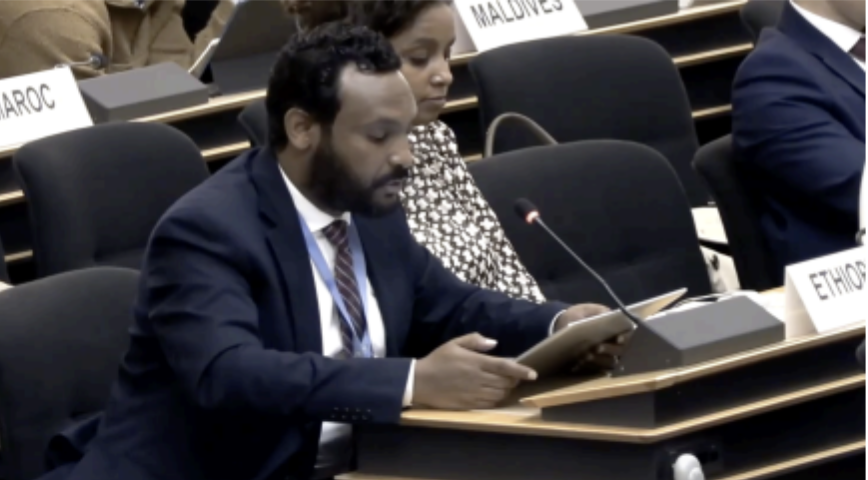
Ethiopia aligns with Ghana and the African Group, praising CAR for its significant progress, especially with the 19th April peace accord. It supports CAR’s efforts to fortify national institutions, welcoming the Truth and Justice Commission, and advocates for its continued autonomy. Emphasising “Africa-led solutions”, Ethiopia calls for sustained international support that respects CAR’s sovereignty and priorities.
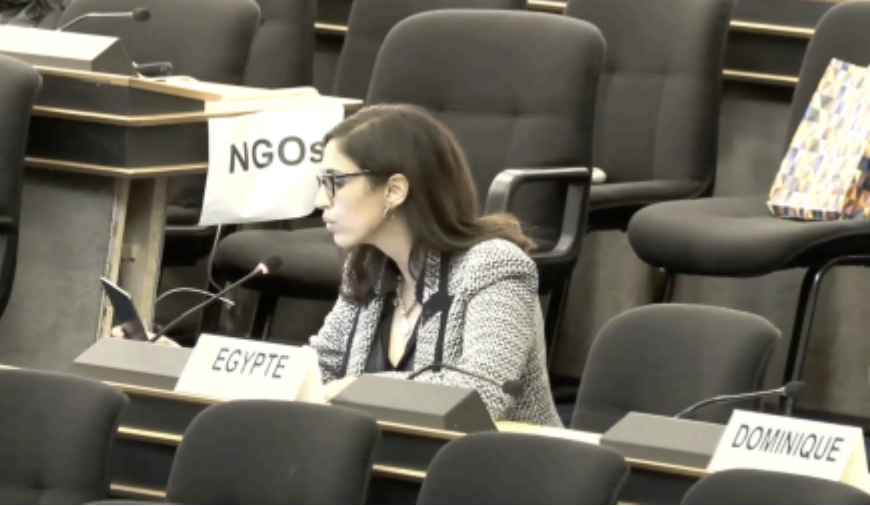
Egypt commended CAR’s UPR participation last year and advises continued involvement to enhance human rights outcomes. Stressing the Council’s crucial role in providing technical support and capacity building, it encouraged the Council to consult with relevant nations, identify their concerns, and tailor support to specific needs.
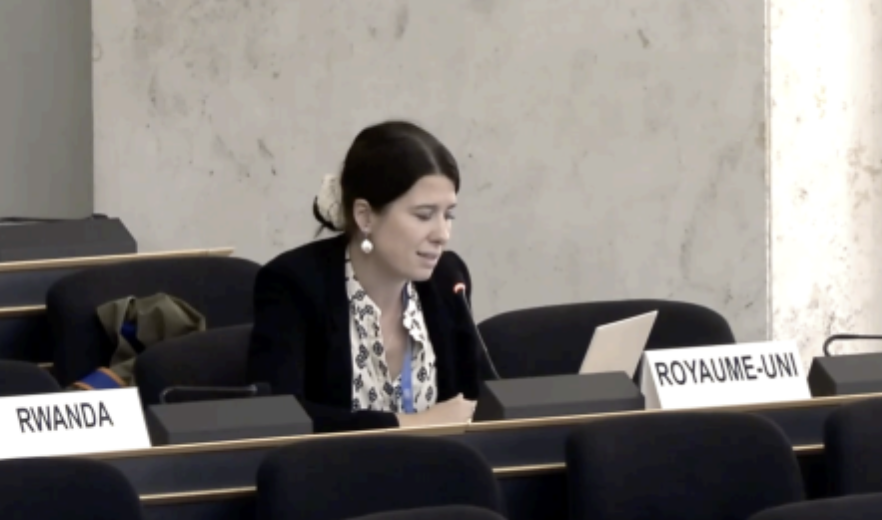
The United Kingdom expressed concerns regarding simultaneous elections in December, highlighting the preliminary need to strengthen the national electoral authority by calling on the government to ensure the “constitutional timelines for elections are met and encourage stakeholders to support the Authority in delivering free and fair elections.” It expressed further concern regarding abuses committed by Russian proxies and armed groups, and called for a strengthening of MINUSCA to ensure the fulfilment of its mandate.
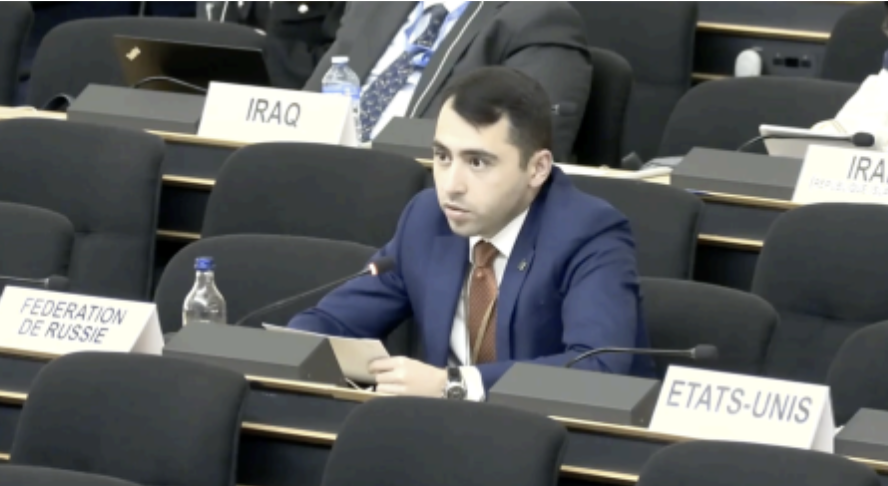
Russia expressed concern about armed groups, their violence against women and girls, and child recruitment. They called on CAR authorities to investigate these abuses, and welcomed the lifted arms embargo and refined sanctions targeting non-reconciling armed groups. They further opposed political pressure on CAR via the HRC, advocating for respect of national interests in human rights actions.
Statements of National Human Rights Institutions and Non-Governmental Organisations
Participating NGOs expressed concern regarding armed groups, like Russia-backed Wagner, which pose severe threats to international humanitarian and human rights law in CAR, consistently committing atrocities such as killings, sexual violence, torture and child abuse, particularly against the Muslim minority. Remote areas of Mbomou and Haut-Mbomou remain under constant threat by virtue of inadequate state authority, further fuelling intercommunity tensions. Prison conditions remain alarming, marked by overcrowding, food scarcity and punitive measures, necessitating a shift towards restorative justice. Full disarmament requires constructive dialogue with remaining groups; the international community must also move beyond broad aid that heightens dependency to sustainable strategies that empower CAR to reclaim authority over resource-rich regions.
Moreover, the unconstitutional removal of presidential term limits, which violate Articles 23 and 25 of the African Charter on Democracy, Elections and Governance, raises concerns about the effective execution of the upcoming elections. The exclusion and imprisonment of opposition leaders, electoral irregularities and compounding delays undermine democratic principles, especially when full and unimpeded participation is critical.
Civilians continue to bear the brunt of grave violence in what has become a “crisis of humanity.” Any proposed resolutions for the nation’s profound difficulties are untenable unless fundamentally structured around the triadic imperatives of robust accountability frameworks, comprehensive civilian protection, and diligent pursuit of inclusive peace.
Conclusion
In his concluding remarks, Mr. Agbetse recalled the April 19th agreement, involving the government and armed groups UPC and 3R, which revitalised the peace process, which led to the appointment of militant officers within the administration. He stated that the accord resulted in the disarmament of 117 combatants in December 2024; however, despite this progress, he highlighted that MINUSCA’s Human Rights Division has recorded sexual violence perpetrated by signatory groups, underscoring the critical need for rigorous monitoring.
He noted crucial international support to be needed across several fronts: for the ongoing electoral process to bolster democracy and advance peace and reconciliation, for the national development plan and human rights policy action plan, and for anti-impunity efforts, including establishing a reparation fund for both the Special Criminal Court and the Truth Commission. Additionally, assistance is needed to enhance defence and security and support DDR programs. Grassroots community services, encompassing access to safe drinking water, education and healthcare, also imperatively need support. Mr. Abestse extended his gratitude to the blue helmets on the ground, acknowledging their immense contributions and sacrifices.
Mr. Agbetse concluded the Interactive Dialogue by expressing his honour in serving the Human Rights Council and the people of the Central African Republic, highlighting the continued necessity of sustained, coordinated support to secure the country’s long-term recovery and stabilisation at a moment when its sovereignty is deeply threatened.
Position of Geneva Centre for International Justice
Geneva International Centre for Justice (GICJ) commends the report of the Independent Expert on the issue of human rights in the Central African Republic and welcomes its recommendations. GICJ remains concerned about the escalating violence, particularly against women and children, and the widespread disregard for international human rights and humanitarian law. All armed groups involved in the ongoing deprivation of CAR must urgently be held accountable, and the mechanisms sustaining their impunity under international law must be deconstructed and unequivocally condemned. GICJ calls on states to take decisive action against violations of fundamental human rights, and to implement measures ensuring the upcoming elections are conducted fairly and impartially, laying the foundations to prevent the recurrence of violations that continue to occur with impunity. GICJ fully supports decentralisation and strengthening national governance systems in favour of a more inclusive future. If the urgent need for disarmament, demilitarisation, demobilisation and repatriation continues to be unmet, GICJ warns that the ongoing reversal of these processes can irreparably stunt the country’s recovery and sustainable development.




